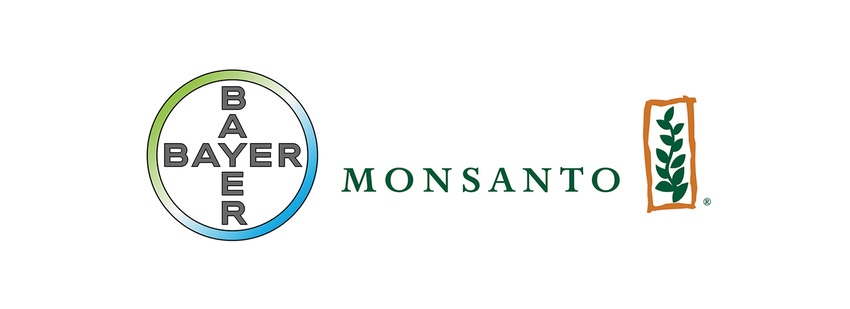DOJ grants U.S. approval of Bayer, Monsanto merger
Bayer AG must divest businesses and assets collectively worth $9 billion in order to proceed with its proposed $66 billion acquisition of Monsanto.

On Tuesday, Bayer obtained conditional approval from the Antitrust Division of the U.S. Department of Justice (DOJ) for the proposed acquisition of Monsanto. DOJ said Bayer AG must divest businesses and assets collectively worth approximately $9 billion in order to proceed with its proposed $66 billion acquisition of Monsanto Co.
The proposed divestiture to BASF, an experienced chemical company with a substantial crop protection business, will fully resolve all horizontal and vertical competition concerns.
DOJ said without the agreed-to divestitures, the proposed merger would likely result in higher prices, lower quality and fewer choices across a wide array of seed and crop protection products. “The merger also threatened to stifle the innovation in agricultural technologies that has delivered significant benefits to American farmers and consumers,” DOJ said.
Under the terms of the proposed settlement, Bayer must divest its businesses that compete with Monsanto. These include Bayer’s cotton, canola, soybean and vegetable seed businesses as well as Bayer’s Liberty herbicide business, a key competitor to Monsanto’s well-known Roundup herbicide.
“Receipt of the DOJ’s approval brings us close to our goal of creating a leading company in agriculture,” Bayer chief executive officer Werner Baumann said. “We want to help farmers across the world grow more nutritious food in a more sustainable way.”
Bayer has now obtained almost all clearances, which are conditions for closing the transaction. Final approvals are still needed from Canada and Mexico. Bayer said it expects to receive any outstanding approvals required for completing the transaction “very shortly.”
Bayer will become the sole shareholder of Monsanto following the receipt of outstanding approvals. According to the DOJ’s conditional approval, the integration of Monsanto into Bayer can take place as soon as the divestments to BASF have been accomplished. Bayer said this is expected to be in approximately two months.
The settlement also requires structural divestitures to remedy the competitive harm that would result from the vertical integration of certain significant Bayer seed treatment businesses with Monsanto’s leading seed businesses. Additionally, because Bayer and Monsanto currently compete to develop new products and services, the settlement requires the divestiture of certain intellectual property and research capabilities, including “pipeline” research and development (R&D) projects. Finally, in order to fully prevent competitive harm from the merger, the settlement requires the divestiture of additional complementary assets that are needed to ensure that BASF has the same innovation incentives, capabilities and scale that Bayer would have as an independent competitor, including, most notably, Bayer’s nascent digital agriculture business.
Baumann spoke at the company’s Annual Stockholders’ Meeting held in Bonn, Germany, on May 25 and said he anticipated being able to close the acquisition of Monsanto in the “near future.”
Bayer has secured bridge financing of originally $57 billion for the acquisition of Monsanto. As announced in September 2016, this is being refinanced by a combination of equity and borrowing measures, some of which have already been completed.
In connection with the merger control process, Bayer divested businesses with sales of 2.54 billion euros (2017) to BASF for a total base purchase price of $8.78 billion. “These divestments were necessary in order to obtain regulatory approval for the transaction,” Baumann explained. “On the other hand, we are acquiring new and very attractive businesses that will take us forward to become a leading agriculture company.”
Feeding growing world population
The U.N. estimates that approximately 10 billion people will populate the globe in 2050. According to Baumann, it will be an enormous challenge to produce food in sufficient quantity and quality for all of them. Bayer and Monsanto together will be able to contribute more to addressing this challenge. “In the future, we will be better placed to help farmers worldwide produce healthy, safe and affordable food in a sustainable manner,” he said.
Bayer will offer them an outstanding portfolio comprising seeds and plant traits; chemical and biological crop protection; digital technologies, information and consulting. “Our offering will thus include many different options that reflect the diverse nature of agriculture worldwide,” Baumann said.
At the same time, he emphasized the significance of innovation. “In the past, it was always farmers who used new processes, new varieties and new technologies to feed a growing population.”
Baumann sees the same situation now – especially against the backdrop of the growing threat to harvests from extreme weather conditions and climate change. “In the search for innovations, we aim to be a partner to agriculture,” Baumann said, emphasizing that the company’s responsibility would be extended through the acquisition of Monsanto. “We will do everything we can to meet this responsibility. Bayer has a reputation for the highest ethical, environmental and social standards.”
Monsanto CEO Hugh Grant intends to leave the company at the closing of the acquisition of Monsanto by Bayer. Robb Fraley will also depart after the closing.
About the Author(s)
You May Also Like




.png?width=300&auto=webp&quality=80&disable=upscale)
